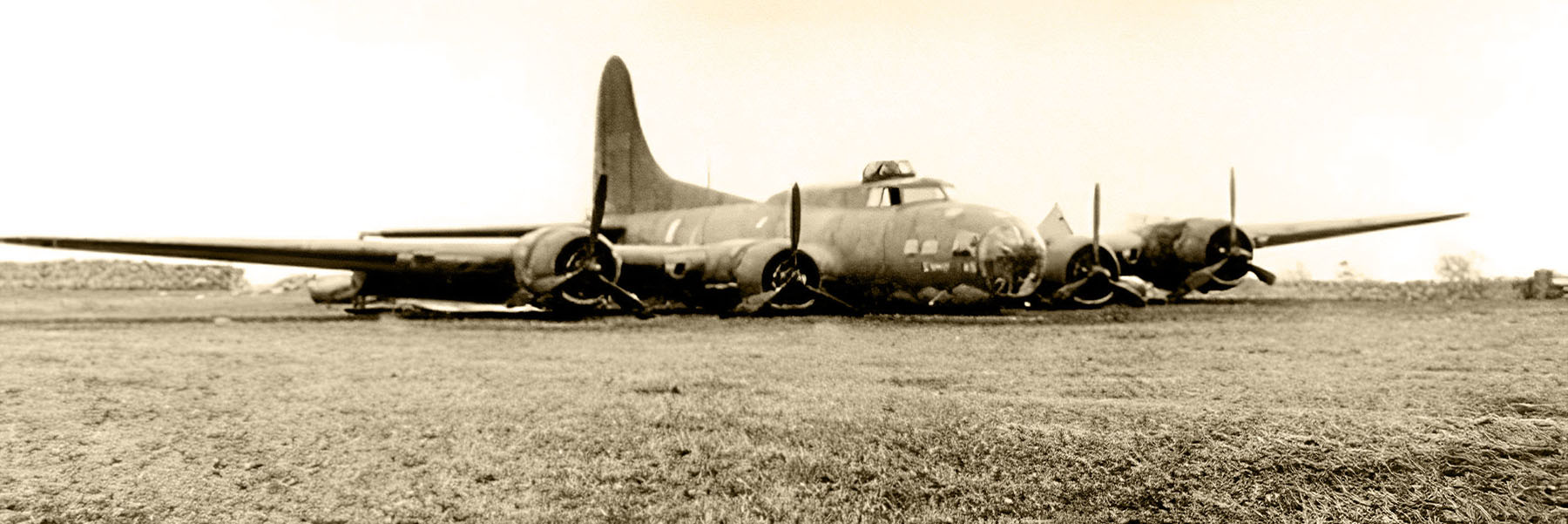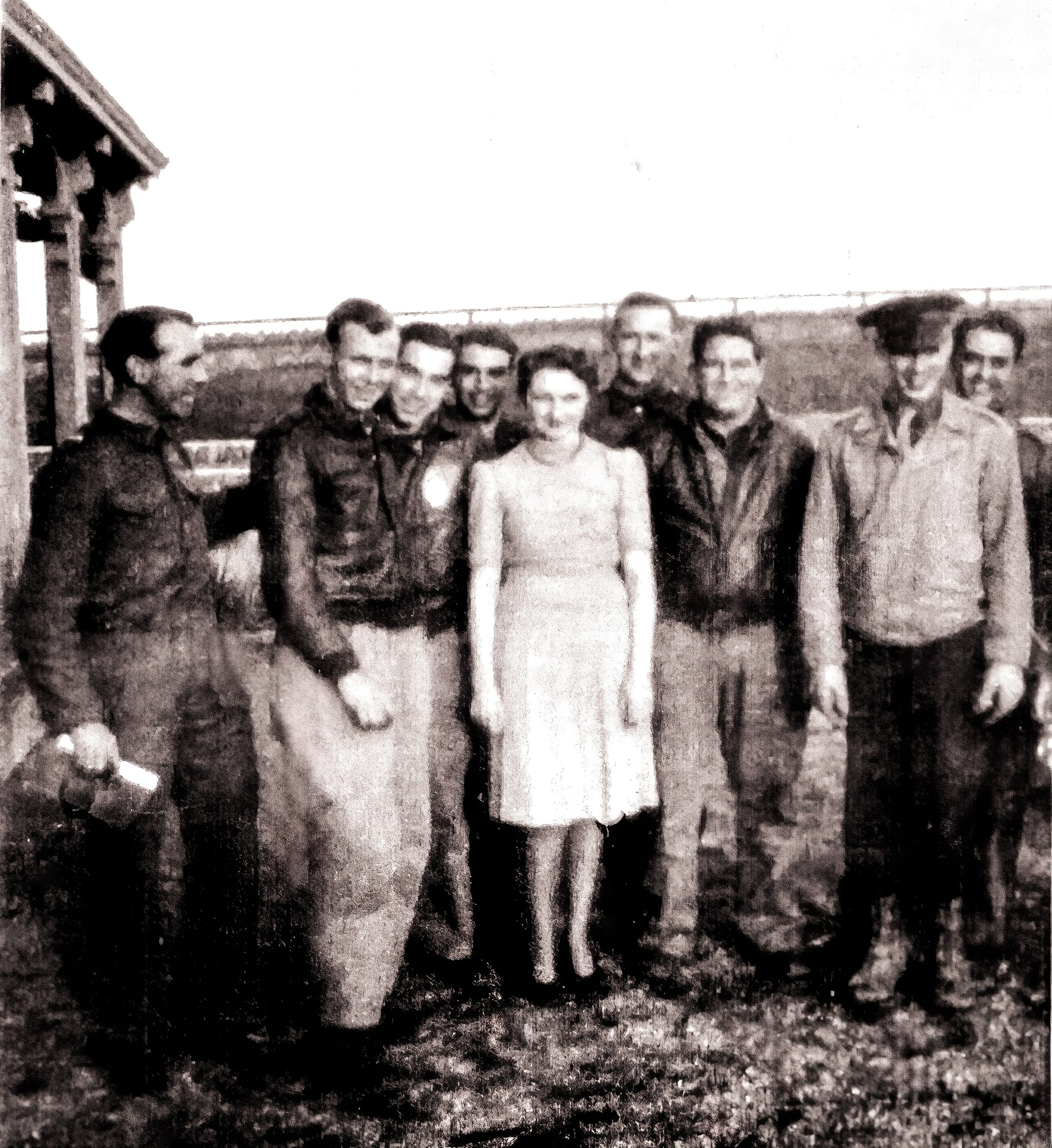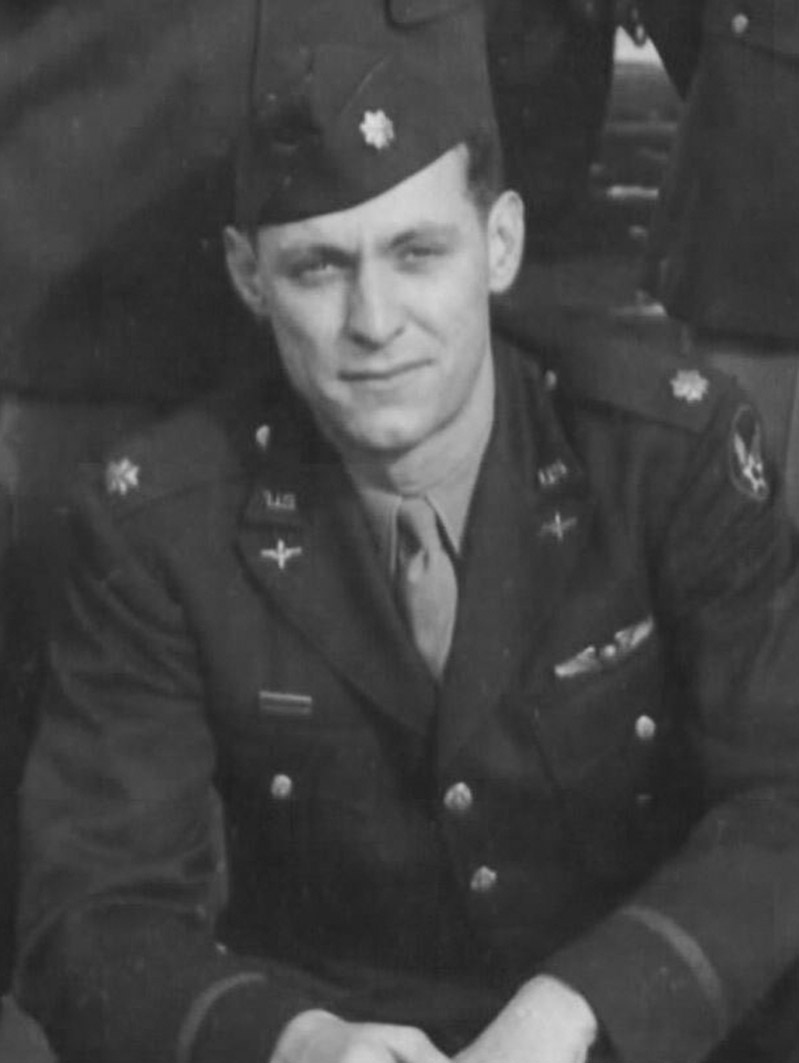WW2 Plane crash at Athenry in 1943

U.S. B-17 Flying Fortress Bomber referred to as 'Stinky"

Members of the crew of 'Stinky" with a local LDF man (on the left) outside the Railway Hotel.

2/Lt J. Kemp McLaughlin Co-Pilot
James Kemp McLaughlin was born in 1918 in West Virginia an published his wartime memories in his book, "The Mighty Eighth in WWII: A Memoir" published first in 2000 and included a chapter that told of his impromptu visit to Athenry.
Upon our return from Casablanca we were again alerted for another trip, this time to England. We were to be going back to our home base. I bought a bushel of oranges and two cases of wine for my mates back at Bovingdon.
Our passengers were Lt. Gen. Jacob Devers, at that time commander of American Forces in the European Theater of Operations, and his staff, consisting of Brig. Gen. Gladeon M. Barnes, Col. William T. Sexton, Maj. Gen. Edward McBrooks, and Maj. Earl Hormell, his aviation advisor.
We departed Algiers in the early afternoon for Gibraltar, arriving about 5 p.m.. We refueled, ate dinner, and began working up our flight plan, which would take us west from Gibraltar, past Portugal, then north across the Bay of Biscay to the English Channel,
then northeast to Bovingdon Airport, just northwest of London.
We delayed our takeoff from Gibraltar until after midnight in order to evade the German fighters and arrive in England well after daylight. Winter dawn didn't arrive until after 8 A.M. (Double Daylight Saving Time). The flight plan called for about seven and a half hours for the entire trip. We also would be flying through a cold front that was drifting southeast across England into France and would present us with head winds and navigation problems all the way.
We got off about 2 a.m. on January 15 and began what seemed to be an uneventful flight. We hit the cold front in the Bay of Biscay and rocked along in it most of the night. Our
navigator was unable to shoot any astro shots because of cloud cover. Shortly after daylight, we encountered a broken-to-scattered cloud deck below our nine thousand-foot mean sea flight level, and about 9:15 a.m. our navigator gave us a northeasterly heading for a southwest England landfall thirty minutes later.
After we turned to our northeasterly heading, General Devers's aide and air advisor pilot, Major Hormell, came into the cockpit and checked our new heading. He then said he was worried that our headwinds had slowed our ground speed so much that our new northeasterly heading might result in a landfall on the Nazi-held Brest Peninsula instead of southwest England, and that German coastal guns might shoot us down.
His argument was a valid one in the sense that the coastlines and terrain were similar, making an identification error possible. Additionally, there was the danger of having the European Theater commander and his staff killed, or worse, captured. He suggested that we turn to a westerly heading for thirty minutes, then north for thirty minutes, then easterly to make sure we hit England instead of France. Lt. Clyde Collins, our navigator, objected, saying we should fly out our flight plan and check the coast features for definite identification before we entered.
In the meantime, Staff Sergeant Teaford, our radio operator, had tried to get us a QDM (Radio Directional Course) from RAF radio stations, but an RAF night-bombing raid was returning, and the stations by regulation would not honor our calls. Lieutenant Hulings
decided to take the major's advice. We returned to a westerly heading, a move that later proved disastrous.
We flew our westerly heading back into the Atlantic, then north, then back on an easterly heading, and made landfall shortly after 11 A.M. We had obviously hit Ireland, but our navigator had no maps of Ireland and could not positively identify anything.
We were in the Galway Bay area, but none of us had ever been to Ireland and, with no maps to identify the towns, bays, and streams, we couldn't be sure. As we circled the area, we saw some peat bogs. One of our passengers was British Flying Sgt. R.C. Bolland, hitchhiking his way home from a three-year tour as a Spitfire pilot on Malta. When he saw the peat bogs, he said he thought it was Scotland, suggesting the idea that perhaps we'd
flown up the Irish Sea and warning that an eastward course that might take us from Ireland to England could also take us from Scotland toward Germany.
We then made a decision to fly north into northern Ireland where two or three American airplane modification depots were located (the northern counties of Ireland were still part of Great Britain). Captain Hulings and I had previously flown to one of them. As we flew north, the rolling farmland began to disappear, and we found ourselves flying over a minor mountain range. By this time we'd been airborne for nearly ten hours, and we began to worry about fuel. Suddenly, one of the low-fuel warning lights flashed on, indicating about twenty minutes of remaining flight time.
Not knowing for certain how far we were from an airport, Lieutenant Hulings elected to fly toward the rolling terrain of the Galway area, in southern Ireland, where we'd have a better chance of finding a field large enough to set down on. At that time he instructed me to go back and tell General Devers of our fuel shortage and of our plan to crash-land the airplane. He also told me to tell Devers that we did have enough fuel to climb the airplane t five thousand feet above sea level and allow the general and his staff to parachute to the ground rather than face the risk of a crash landing. After I explained the situation to General Devers, he said, "Son, what are you going to do?" I said "Sir, I'm going to help
Captain Hulings land this airplane." He said, "All right, son, we’ll do whatever you're going to do.”
When I returned to the cockpit and told Hulings of the General's decision, Hulings alerted the crew to prepare for a crash landing and to so instruct all the passengers. By this time
all four red low-fuel warning lights were on, and we knew the end was near.
We circled and noted that nearly every field large enough to land an airplane on had a large post in the center. The Irish haddone this to make certain that no British airplane would land without wrecking or at least incurring damage. Also, all the fences dividing the fields were of stone.
We decided on a narrow field on which we could approach and land into the westerly wind. It too had rock-wall fences, and because it was narrow, it looked longer than it actually was. It contained a few cows, but they were feeding along the southern
side, which left us enough room to roll down the center. We set up a long approach and dragged our B-17 in with full flaps, landing gear down. She settled in after we crossed the eastern fence.
We both stood on the brakes as the airplane hydroplaned on the wet grass for the rest of the length of the field. The landing gear was knocked off as we hurdled the far wall fence, and the airplane came to rest on its belly in the next field. I pulled back my side window and looked down and saw smoke rising from the number three engine. I panicked, tossed my chute harness, and slithered out through that window, which was about eighteen
inches by eighteen inches. For fifty-five years I've wondered how a man my size could have done that.
I then ran to the rear door of the airplane and began helping our passengers out. Of the seventeen people on board, none was injured. Just after we landed, I saw an Irish Home Guard soldier with a rifle running through the trees toward us, yelling in Gaelic and waving his arms. General Spaatz had given me three letters to be delivered to Gen. Ira Eaker and two others at 8th Bomber Command. Not knowing what they contained, I was alarmed that
they might fall into the wrong hands. I asked General Devers what I should do with them. He said, "Eat them." I quickly and quietly consumed them without further ado.
The Irish soldier could speak only Gaelic, and none of us could converse with him, so we began to unload our personal effects. As the local folks began gathering around, my two cases of wine and basket of fruit soon disappeared. The Irish, like the English, hadn't seen any tropical fruit since the war began. Staff Sergeant Teaford blew up the IFF (Secret Identification Equipment) so it would not be captured intact. (Each IFF set had a built-
in explosive charge to ensure its destruction, if necessary.) We carried no Norden bombsight aboard this flight.
By this time, a few Irish people began to gather around us, along with a very elegant Irish lady on whose farm we had landed. She carried a stone jug of Irish whiskey and several coffee mugs. The local parish priest accompanied her. She greeted us very cordially and insisted we have a cup of whiskey. General Devers suggested we all accept her gracious hospitality, so we each had about six to eight ounces of straight Irish whiskey. It was now
noon and, not having eaten since the night before, that cup of whiskey quickly wiped away my strongest apprehensions. In fact, I couldn't hit the ground with my hat and, totally relaxed, everything suddenly became kind of funny. The priest presented me with a religious medal for good luck.
Shortly the locals found some automobiles and drove us to a hotel near the town of Athenry. They immediately opened the bar and we began to have more drinks while they prepared our lunch. By the time lunch was served we were all three sheets to the wind,
and after having been up all night I could hardly keep my head up as we supped on a delicious breakfast of steak and eggs.
Shortly after we arrived at the inn, one of General Devers's staff called the American consul in Dublin and arranged for our transportation out of southern Ireland (the Irish Republic). We remained around the dining hall until after dark. Officially, southern Ireland was a neutral country, and, according to the Geneva Convention, we were supposed to have been interned there for the rest of the war.
Early in the evening two sedans and a small bus arrived. We quickly boarded and headed for northern Ireland, arriving well after midnight. We spent the rest of that night at Langford Lodge. The following day we flew back to our home base at Bovingdon, Hertfordshire, our original destination.
After arriving back at Bovingdon, I fully expected an investigation and a formal hearing on our snafu. Except for a letter of explanation that Lt. Tom Hulings wrote, nothing happened. I'm certain that General Eaker and General Spaatz realized that our crew had only a few months' flying experience, that this flight was only the third flight over water for our navigator, and that an investigation would be a waste of time.
